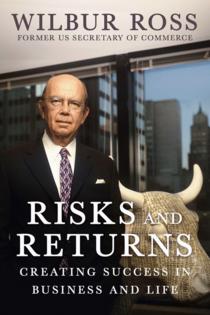Mastering the game: Wilbur Ross on power, profit and perseverance
Published in Mom's Advice
It was one of his earliest and most unforgettable moments in corporate life. Young Wilbur Ross was closing a real estate deal with the legendary Bill Zeckendorf at the real estate magnate’s panoramic and totally circular office. Catching Ross gawking at his surroundings, Zeckendorf comes up from behind, puts his arm around the young man, and says, “If you had been backed into a f__ing corner as often as I have, you would want a goddamn round office too.”
Not that Ross had been scratching and clawing his way out of adversity all his life, but, well, it comes with the territory of being a Wall Street legend, known as the “King of Bankruptcy.” Over a 55-year career, he helped structure more than $400 billion in assets, was named by Bloomberg as one of the 50 most influential people in global finance, and served — and survived — four tumultuous years as secretary of commerce under President Donald Trump.
That illustrious history and the many lessons learned with it make up the substance of his just-released memoir and life primer, "Risks and Returns" (Regnery, an imprint of Skyhorse Publishing Inc.).
The subtitle of the book, “Creating Success in Business and Life,” is not so much a roadmap for young financiers, but rather the path Ross took to reach the pinnacle of his profession. It is colored with fascinating anecdotes from his Harvard Business School days to his start on Wall Street to his counsel with some of the giants of business to his Cabinet position under Trump. The company names he worked with and for read like a Fortune 100 list, and as for the people, Ross finds himself rubbing elbows with names like Rothschild, Buffett, Icahn, Milken, Branson, King Charles, John Lennon.
Ross’s anecdotes do indeed paint a picture of financial life in the fast lane. For example, there’s the time that, during the Federated Department Stores hearings, a professor says, “Mr. Chairman, investment bankers are to the financial system what mud wrestlers are to the performing arts.” As Ross starts to refute, the room can hear the professor mutter, “Another goddamned mud wrestler.”
Or the time that Martin Shugrue, the only man ever to be the CEO of two airlines as they went into bankruptcy, says to Ross, ”You were educated at Yale and Harvard. Surely you can find more appropriate clients than the skirts who are stewardess and the thugs who are Teamsters. You should be ashamed. You have some nerve coming in to tell me how to run an airline.”
Ross was raised by parents who were Democrats but early in his adult life he switches to the Republican Party and eventually lands the Cabinet position under Trump. While he finds the role rewarding, he is also subject to the whims of the commander in chief. A 6:30 a.m. call from Trump demanding he go on TV to oppose the Fed’s decision to raise rates is nothing out of the ordinary.
And there’s the scrutiny from Congress and as well as the media. In a high political position, you give up a part of your life and your privacy.
Ross no doubt is a financial genius, but for readers of "Risks and Returns" fearing they will be caught up in theory and formulas, that is not the case. Ross is a convincing storyteller, with anecdote after anecdote told in layman’s terms for all to cherish, whether playing tennis at Carl Icahn’s oceanside house or hearing Donald Trump lament on how the Obama administration overspent for the ceremonial pens to sign documents into laws. You’ll find yourself savoring one story and then thirsting for the next.
You’ll also find some of the author’s ideas to improve the political system and our regulatory environment.
But as much as anything, "Risks and Returns" gives you insights into one of the financial titans of the last half century, through his actions, his philosophies and his thinking.
“No one will live a life free of difficulty … Lifestyle issues, boring jobs, dumb bosses, work pressures, low pay, political issues … Instead of concentrating on them … drop the self-pity and get on with an affirmative direction.”
“Do not be afraid of taking rational risks — I have found that accepting them as the essential ingredient to achieving high-level returns. Just make sure that you think them through.”










Comments